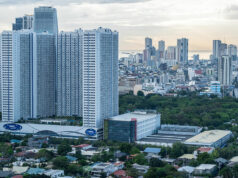Bureaucracy seen delaying benefits to rice farmers
By Reicelene Joy N. Ignacio
Reporter
THE NEWLY-SIGNED Republic Act (RA) No. 11203 or Rice Tariffication law is expected to reduce poverty by bringing down rice prices, but the bureaucratic process may delay the farmer relief measures attached to the law, academics said.
The law is to implemented beginning March 5, with the National Food Authority’s (NFA) import functions to be removed, leaving the task to the private sector. A 35% tariff will be charged for imports from ASEAN countries, while 40% will be imposed on shipments from non-ASEAN countries for imports within the Minimum Access Volume (MAV) of 350,000 metric tons (MT).
The tariffs will finance the Rice Competitiveness Enhancement Fund (RCEF) at P10 billion a year for six years, with 50% to be distributed for farm mechanization; 30% for development, propagation and promotion of inbred seed; 10% for low-cost credit to be facilitated by the Land Bank of the Philippines (LANDBANK) and the Development Bank of the Philippines (DBP); and 10% for extension services to upgrade farmers’ skills.
“Farmers will be affected because imported rice can be sold at P35 per kilogram (kg) or about P17 per kg for palay (unmilled rice), (which is) great for consumers. That is why the government must have income support for rice farmers,” Rolando T. Dy, Executive Director of the University of Asia and the Pacific (UA&P) Center for Food and Agribusiness, said in a mobile message.
Mr. Dy noted that if government acts in accordance with the law, it will spur development, though the bureaucracy may take time to establish an efficient process for distributing the RCEF benefits.
“It will take time to implement the P10 billion RCEF due to organizational and bureaucratic weaknesses. I support the Rice Tariffication Act. I am skeptical on the bureaucracy to quickly deliver the RSBSA (Registry System for Basic Sectors in Agriculture) fund transfer and the RCEF,” Mr. Dy said.
The Department of Agriculture (DA) said last week that it is now fast-tracking the updating and validation of its National Farmers and Fisheries Information System (NFFIS) which will form part of the RSBSA that will serve as the official list of recipients of RCEF.
Mr. Dy said that investing in mechanization will benefit farmers, reducing the labor required and lowering production costs.
“Mechanization has done well for Vietnamese farmers. Based on the IRRI (International Rice Research Institute) PhilRice study, rice farmers in Nueva Ecija use 44 man-days per hectare mainly for transplanting and harvesting. Vietnamese farmers use only four man-days. Big cost difference. The machinery should be the farmers’ choice,” Mr. Dy said.
Mr. Dy noted that rice demand falls as per capita income increases.
“Rice demand falls as per capita income increases. Our problem is very high poverty. Malaysia’s per capita demand is down to 82 kg compared with the Philippines’ 110 kg. South Korea’s is 62 kg, China’s is 78 kg, Japan’s is down to 60 kg… Per capita consumption in most of Asia is falling,” Mr. Dy said.
Roy S. Kempis, a professor with Pampanga State Agricultural University, said imports outside the MAV will be charged higher tariffs of up to 180%, which is why he does not expect imported rice to flood the Philippine market. However, he said the game at the point of import becomes misdeclaration of rice volume.
“Volume to comply with the MAV for 35% tariff must meet the 2012 minimum of 350,000 MT from ASEAN countries, 50% from non-ASEAN countries. Any excess imports from the MAV shall be assessed higher tariffs… One has to be wary of misdeclarations of volume of imports,” Mr. Kempis said in an e-mail interview.
“Opposition to the law must be based on responsible and objective appreciation of the principles of agricultural economics, not politics,” according to Mr. Kempis.
Mr. Kempis said he does not expect the law to encourage dependence on imported rice or threaten the livelihood of farmers.
“Filipino rice farmers will always plant rice, especially for their home consumption. Local and fresh rice is an experience that rice farmers will not exchange for imported rice which is usually old stock… But you have to be wary of people mislabeling rice sold to consumers public,” Mr. Kempis said.
He added some opportunists could scare farmers into selling their land by painting a negative scenario under rice tariffication.
Mr. Kempis backs consolidation of small farms into 50 to 80-hectare plots in order to maximize the efficiency of farm machinery.
Krista Danielle S. Yu, a professor with De La Salle University’s (DLSU) School of Economics (SoE), said the government should also make a strong push for crop insurance and direct cash transfers.
“There is a need to develop programs should rice tariff collections exceed P10 billion. Based on our computation, the welfare loss due to operating with quantitative restrictions was P28 billion. We suggest that a cash transfer program targeted specifically to rice farmers be implemented with the remaining collections. Also, given that farmers are vulnerable to the effects of climate change, crop insurance is also another program worth looking into,” Ms. Yu said in an e-mail.
Asked if farmers will experience losses from more extensive imports, Ms. Yu said, “Initially, rice farmers may incur losses as a result of influx of imported rice. But rice farmers are also rice consumers. Harvested palay meeds to be milled in order to become rice which is now cheaper for farmers thereby yielding gains for them as rice consumers.”
On Sunday, the Federation of Free Farmers (FFF) warned economic managers and Senator Cynthia A. Villar, the sponsor of the law, of the consequences of the liberalization of rice imports.
“We warned her (Ms. Villar) several times of the danger of abruptly removing NFA’s price stabilization functions, but she did not listen. She just echoed the theory of the economic managers that the free market will take care of everything. Now she is saying the President will take care of it. In effect, she has placed the President in a legally tenuous and politically dangerous trap in case things go awry,” FFF National Manager Raul Q. Montemayor said in a statement.



